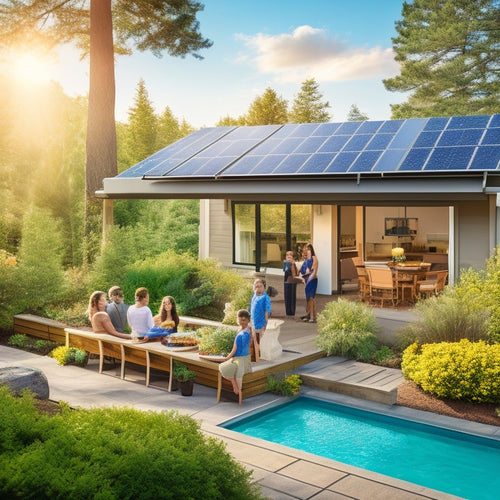
Why Claim Home Renewable Energy Tax Credits?
Share
You can claim home renewable energy tax credits to access significant financial and environmental benefits. By installing qualified renewable energy equipment, you'll lower your tax liability and increase your energy savings over time. Your home's value will also get a substantial enhancement, making it more attractive to potential buyers. Additionally, you'll support a sustainable future by reducing your carbon footprint and reliance on fossil fuels. And, with federal and state incentives, you can maximize your savings. By taking advantage of these credits, you'll not only reap these benefits but also uncover more ways to optimize your energy strategy and maximize your returns.
Key Takeaways
- Claiming home renewable energy tax credits reduces tax liability by up to 26% of system costs through federal and state incentives.
- Installing renewable energy equipment leads to significant long-term savings on energy bills, enhancing energy efficiency and reducing reliance on fossil fuels.
- Renewable energy systems increase property values substantially, with solar power systems adding up to $15,000 in resale value.
- Claiming tax credits supports a sustainable future by reducing carbon footprints, conserving water resources, and decreasing air pollution.
- Maximizing tax savings through renewable energy credits helps stay ahead of rising energy costs, ensuring financial stability amidst price fluctuations.
Reduce Your Tax Liability
You can considerably reduce your tax liability by claiming home renewable energy tax credits. This incentive is designed to encourage homeowners to invest in environmentally friendly energy solutions.
In addition to federal credits, homeowners can also take advantage of state rebate programs State Rebate Programs and net metering Net Metering to further offset the cost of their renewable energy investment.
To qualify, you must meet the eligibility requirements, which include installing qualified renewable energy equipment, such as solar panels or wind turbines, in your primary or secondary residence.
When filing your taxes, you'll need to complete Form 5695, which calculates the credit amount based on the equipment's cost. The credit amount can then be claimed on Form 1040.
Increase Your Energy Savings
Installing renewable energy equipment in your home can lead to significant energy savings over time. By utilizing power from renewable sources like solar, wind, or geothermal energy, you reduce your reliance on traditional fossil fuels. This not only helps the environment but also increases your energy efficiency.
Renewable technologies are designed to optimize energy production, minimizing waste and reducing consumption. Additionally, understanding energy literacy is essential for maneuvering the complex renewable energy environment and evaluating the feasibility of energy sources.
As a result, you'll see a decrease in your energy bills, saving you money in the long run. By integrating these energy-efficient solutions, you'll be able to enjoy a more sustainable lifestyle while padding your wallet.
Boost Your Home's Value
As homeowners invest in renewable energy systems, their property values tend to increase substantially. This increase in value can be attributed to the various benefits that come with renewable energy installations. Not only do they reduce your carbon footprint, but they also provide a competitive edge when selling your property.
Moreover, solar power systems can sell for up to $15,000 more than non-solar homes enhancing property resale value, making them more attractive to potential buyers. In addition, high demand for solar-equipped homes enhances curb appeal and buyer interest.
-
Home improvements: Renewable energy systems are considered significant home improvements, which can increase your property's appeal to potential buyers.
-
Property appraisal: When appraising your property, the added value of renewable energy systems is taken into account, resulting in a higher overall value.
-
Energy efficiency: Renewable energy systems reduce energy consumption, leading to lower utility bills and increased energy efficiency.
- Government incentives: Claiming home renewable energy tax credits can also increase your property's value, as they provide a financial benefit to potential buyers.
Support a Sustainable Future
Renewable energy systems not only increase property value but also contribute to a sustainable future.
By installing renewable technologies, you're supporting sustainable practices that reduce your reliance on fossil fuels and lower your carbon footprint. This not only benefits the environment but also sets an example for your community.
| Renewable Technology | Environmental Benefits | Sustainable Practices |
| Solar Panels | Reduce greenhouse gas emissions | Generate clean energy locally |
| Wind Turbines | Conserve water resources | Decrease air pollution |
| Geothermal Systems | Protect ecosystems | Promote energy independence |
Take Advantage of Incentives
You can considerably reduce the cost of investing in renewable energy systems by taking advantage of available incentives.
These incentives are designed to encourage homeowners like you to adopt sustainable energy solutions, and they can make a significant difference in your financial planning.
By incorporating these incentives into your tax strategies, you can maximize your savings and make your renewable energy investment more affordable.
Here are some key incentives to evaluate:
- Federal Tax Credit: Claim up to 26% of the total cost of your renewable energy system as a tax credit.
- State Tax Credits: Many states offer additional tax credits for renewable energy systems, which can be claimed in addition to the federal credit.
- Net Metering: Sell excess energy back to the grid and offset your utility bills.
- Local Incentives: Check with your local government and utility companies for additional rebates, grants, and incentives.
Stay Ahead of Rising Costs
You can reduce your energy expenses by installing renewable energy systems, such as solar panels or wind turbines, which will lower your reliance on traditional energy sources.
By doing so, you'll lock in savings over time, as the cost of traditional energy continues to rise.
This proactive approach will help you stay ahead of rising costs and maximize your return on investment.
Reduce Energy Expenses
By incorporating renewable energy systems into your home, energy expenses can be notably reduced, thereby staying ahead of rising costs. This is especially important given the increasing unpredictability of traditional energy sources.
As you shift to renewable energy, you'll enjoy improved energy efficiency and lower your reliance on the grid.
Here are some key benefits to evaluate:
- Lower utility bills: Renewable energy systems can greatly reduce your energy expenses, leading to substantial savings over time.
- Increased energy independence: By generating your own energy, you'll be less reliant on external power sources and their associated costs.
- Improved energy efficiency: Renewable energy systems often promote more efficient energy use, further reducing your expenses.
- Offsetting installation costs: While the initial installation costs of renewable energy systems can be high, the long-term savings can help offset these expenses.
Lock in Savings
Rising energy costs can be a significant burden on homeowners, but incorporating renewable energy systems can provide a safeguard against these increasing expenses.
By investing in renewable energy, you're not only reducing your energy expenses but also locking in savings for the long term. This strategic financial planning allows you to stay ahead of rising costs, ensuring your wallet isn't drained by unpredictable energy bills.
With renewable energy, you can enjoy long-term benefits, including stable energy costs, reduced reliance on fossil fuels, and a lower carbon footprint.
Frequently Asked Questions
Can I Claim Renewable Energy Credits for Rental Properties?
As you steer through the Wild West of tax credits, you're wondering if you can claim renewable energy credits for rental properties. Thankfully, yes, you can, as long as you meet the rental property eligibility criteria, reaping tax credit benefits that'll make your investment shine like a solar panel on a sunny day.
Do Energy-Efficient Appliances Qualify for Tax Credits?
You can qualify for tax credits by investing in energy-efficient appliances that meet Energy Star standards, as these appliance upgrades lead to significant energy savings, but be sure to review the IRS's specific guidelines for eligible products and requirements.
How Long Do I Have to Keep Records for Tax Credit Claims?
You'll need to maintain thorough record retention for tax documentation, keeping receipts, invoices, and certification documents for at least three years after filing your tax return, in case of an audit or verification request.
Can I Claim Tax Credits for DIY Renewable Energy Installations?
Are you a DIY enthusiast who's gone green? You can claim tax credits for your DIY renewable energy installations, but only for eligible expenses, such as materials and equipment, not labor costs, as long as they meet IRS standards.
Are There State-Specific Renewable Energy Tax Credits Available?
You'll find state-specific incentives for renewable energy installations, beyond federal credits, by researching local programs and state incentives that offer additional tax credits, rebates, or grants, which can greatly reduce your project's overall cost.
Related Posts
-

Top Eco-Friendly Camping Equipment for a Sustainable Adventure
When you're camping with the planet in mind, opt for eco-friendly gear like tents made from recycled materials and bi...
-

Top Portable Refrigerators for Camping Adventures
When you're camping, having a reliable portable refrigerator can make all the difference for keeping your food fresh ...
-

Top-Rated Home Solar Power Kits for Achieving Energy Independence
Top-rated home solar power kits enable you to achieve energy independence by greatly cutting your energy costs. You c...


